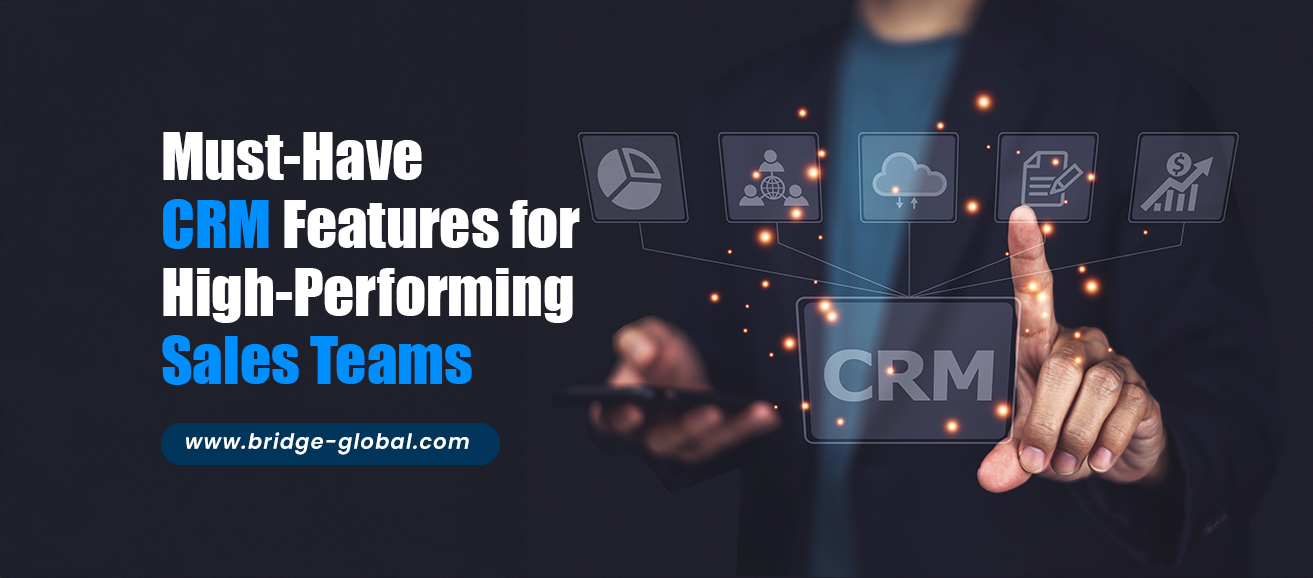Top CRM Features Every Sales Team Needs
In a world where sales cycles are shortening and customers expect immediacy, the quality of your CRM can make or break revenue growth. The features your sales team uses daily either enable high velocity or introduce friction. That’s why understanding the essential CRM features and building or selecting tools with these in mind is crucial.
A forward-thinking software development company or team that crafts strong systems can enable sales teams to hit quota more reliably, reduce errors, and deepen customer relationships.
What Makes a CRM Truly Supportive for Sales
A sales team doesn’t need every feature under the sun; it needs the right ones. At minimum, a CRM should centralize contact and opportunity data, offer workflow automation, integrate with other business systems, provide reporting and analytics, and be usable on the go. When those basic pillars work well, sales teams spend less time hunting down information and more time selling. High-quality CRM features improve accuracy, enabling follow-ups, forecasts, and customer interactions to be precise and timely.
Essential CRM Features to Prioritize

1. Opportunity & Pipeline Management
Sales teams operate around pipelines and opportunities. Robust CRM solutions should allow clear visualization of stages, intuitive movement of deals, and visibility into deal health. Features like probability scoring, alerts when deals stall, and custom stages tailored to your business model are essential. These capabilities give leadership and reps alike a clear view of where revenue will come from and where risk might lie.
2. Lead Scoring & Prioritization
Not all leads are equal. Your CRM should help your sales team prioritize efforts by scoring leads based on behavior, firmographics, engagement, and history. Machine-assisted scoring (or built-in predictive analytics) ensures that the hottest leads are reached first. This reduces wasted outreach and improves conversion rates. With the right algorithms and feedback loops, these features refine themselves over time.
3. Workflow Automation & Task Reminders
One of the biggest drains on productivity is repetitive tasks: updating records, sending email follow-ups, reminding reps of tasks. A CRM with built-in business automation features handles these quietly in the background. For example, auto-assigning tasks, setting reminders for follow-ups, triggering alerts when a stage has stayed idle too long - all of this ensures no opportunity slips through cracks. Meaningful automation lets salespeople stay focused on high-value work.
4. CRM Integration & Data Reliability
A CRM that lives in isolation isn’t very helpful. CRM integration with email, marketing platforms, ERP software solutions, customer support, and even ecommerce tools ensures that everyone works from the same up-to-date information. Data reliability is essential: outdated leads, inconsistent contact info, or disconnected inventory data lead to lost sales. Integrated systems reduce manual entry, cut down on errors, and allow sales to operate with confidence.
5. Reporting, Dashboards, & Forecasting
Sales teams need visibility: how many deals are in each pipeline stage, what’s the expected revenue, which reps are performing well, where are the bottlenecks. A CRM should provide customizable dashboards, real-time reporting, historical trends, and forecast models. Reliable forecasts help leadership allocate resources, identify coaching needs, and manage targets. The difference between guessing and planning often comes down to whether your CRM gives you visibility.
6. Mobile Access & Remote Readiness
Modern sales is rarely office-bound. Whether in meetings, on the road, or during remote work, reps must access contacts, update opportunities, log interactions. Mobile apps should be nearly as capable as desktop versions: adding notes, updating status, accessing dashboards, even pushing deals forward on mobile. A CRM with strong mobile readiness supports flexibility and agility in how teams work.
7. Customization & Extensibility / Salesforce Alternatives
Every business has its quirks: industry, terminology, deal stages, KPIs. A CRM must support customization - custom fields, custom object types, configurable pipelines, user-defined workflows. For firms that find Salesforce too heavyweight or expensive, Salesforce alternatives can offer similar or comparable features with lighter cost or simpler licensing. The right system lets you tailor rather than force-fit your processes.
ERP Software Solutions & Unified Systems
Sales often depend on external data: stock levels, supply chain delays, finance, fulfillment timing. That’s where integrating with ERP software solutions becomes essential. When sales reps know what is in stock, when new inventory arrives, or what delivery times look like, they can set customer expectations correctly, avoid overpromising, and prevent revenue leakage. A CRM connected tightly with ERP gives a single source of truth from order to fulfillment. This also supports broader business automation: orders trigger inventory adjustments, finance entries, and customer notifications. The transparency across departments removes bottlenecks and improves customer trust.
Supporting Features for Efficiency & Customer Experience

Beyond the critical pillars, several supporting features make the difference between a good CRM and a great one.
Email & Communication Tools built into the CRM allow tracking of email opens, template management, auto-replies, and history logging. When sales conversations are recorded and visible, follow-ups are better, prospects don’t fall through the cracks, and teams can collaborate more easily.
Document & Quote Management matters when proposals, contracts, or quotes need to be generated and shared. CRM features that let you generate templated quotes, integrate electronic signature, version documents, or store sales collateral make the selling process smoother.
Customer Interaction History & Context is essential. Sales reps benefit when they can see prior conversations, customer modes of purchase, prior objections, service tickets, and feedback - all in one view. Having this context helps reps personalize their pitch, anticipate objections, and build trust faster.
Territory & Role Management ensures that territories are fairly distributed, that managers can see aggregate performance without micromanagement, and that roles have appropriate visibility. Not every rep needs global CRM admin rights, but none should lack visibility into what affects their deals.
Choosing Between Salesforce Alternatives & Custom Builds
While Salesforce leads in recognition and has a huge ecosystem, many companies reassess whether it’s the best fit, especially in terms of cost, complexity, and lock-in. For some, using Salesforce alternatives like HubSpot, Zoho CRM, or Microsoft Dynamics 365 makes sense. These often offer more straightforward pricing, easier customization, less admin overhead, or specific features built in.
A different path is building or adapting a CRM via custom software development. Working with a competent software development company, you can build or tailor a CRM to your sales process, integrate with ERP or other internal systems, add features just for your domain, and avoid paying for unused parts. Customized CRMs can be leaner, better fit, and quicker to evolve when process changes happen.
Why Automation & Business Automation Matters
Automation in modern CRM systems isn’t “nice to have” - it’s a necessity. Business automation amplifies every other feature: auto-assignment of leads, drip campaigns, reminders, scoring, report generation. It helps maintain consistency, reduce manual errors, and free sales staff to focus on strategic and interpersonal tasks. When automation is embedded, CRMs become engines of efficiency rather than just record-keeping tools. Speed, consistency, and reduced friction are the payoffs.
Integrating Security, Scalability, and Usability

As you select or build your CRM, it’s critical to balance powerful features with security and scalability. Sensitive customer data must be protected through access controls, encryption, audit trails, and compliance with regulations. Scalability matters: what works for a small sales team must scale when you have ten times more users or ten thousand customers. Usability cannot be overlooked: intuitive interfaces, fast UX, minimal friction in updating records, and accessible support/training.
Implementation Best Practices
Even with a great feature list, poor implementation undermines value. Start with requirement gathering: involve sales reps, managers, operations, and downstream teams like finance and fulfillment to understand what they need from the CRM. Prioritize critical CRM features first, deploy them in phases, get feedback early, and iterate frequently. Train users well; change management matters because people resist change unless they see benefit. Measure KPIs: user adoption, time spent updating records, lead response times, deal velocity. And continuously review the system, pruning unused features and refining workflows.
Conclusion
The right CRM features make all the difference between a sales team that delivers and one that struggles. From pipeline & opportunity management, lead scoring, robust automation, deep integration (especially with ERP software solutions), customizable workflows or Salesforce alternatives, to strong reporting and mobile readiness - these are the pillars of modern sales success. A good CRM built with the help of a competent custom software development company doesn’t just record; it accelerates, predicts, supports, and grows with the team.
For organizations evaluating new tools, choosing between building (via custom software development) or selecting proven platforms, always focus on features that deliver velocity, clarity, and trust. When your CRM truly supports the sales team, everyone wins: customers, sales reps, leadership - and ultimately, the bottom line.



